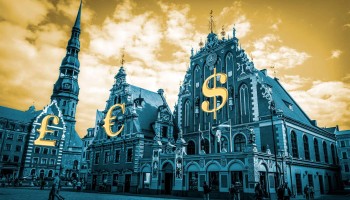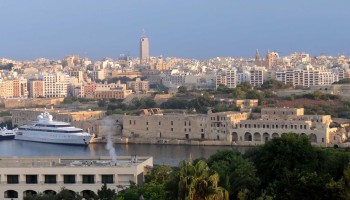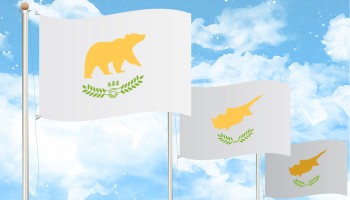An anchor at one of the Kremlin-controlled news stations reported that Russia’s parliament had allowed President Vladimir Putin to use the army to protect his compatriots in other countries . In other words, they had legalized the annexation of Crimea and allowed Putin to provide support for pro-Russian combatants in Eastern Ukraine.
“I remember very well the day, hour and second when the decision was made,” the director recalls on a cold January morning in the Latvian capital of Riga, where he had just returned from filming in Ukraine. “After this announcement, the ensuing events became obvious. Everything which I foresaw has happened to the millisecond. This was the end.”
He called his wife. They wasted no time. “We arrived in Riga and after three days we left with a residence permit.”
It took just a day for them to find and buy an apartment with ornate painted ceilings in the center of Riga, at a bargain price by Moscow standards. Just like that, Mansky became one of the 3,173 Russian citizens who gained the right to reside in Latvia last year, under a special program that allows foreigners who spend a certain amount of money on real estate to gain residence permits in Latvia.
The Latvian capital is about 90 minutes by air from Moscow. Most of its residents speak Russian. But the main attraction is Latvian laws that allow property owners to get Latvian and thus European Union residency. And Latvian property is cheap, making it easily affordable for even middle-class Russians.
In Latvia, foreigners who buy property can get a five-year residency permit, called a “golden visa,” that lets them travel and live freely in most of the European Union . How much you need to invest varies, depending on where the property is located, and the two most popular areas for foreign investment are the two most expensive.
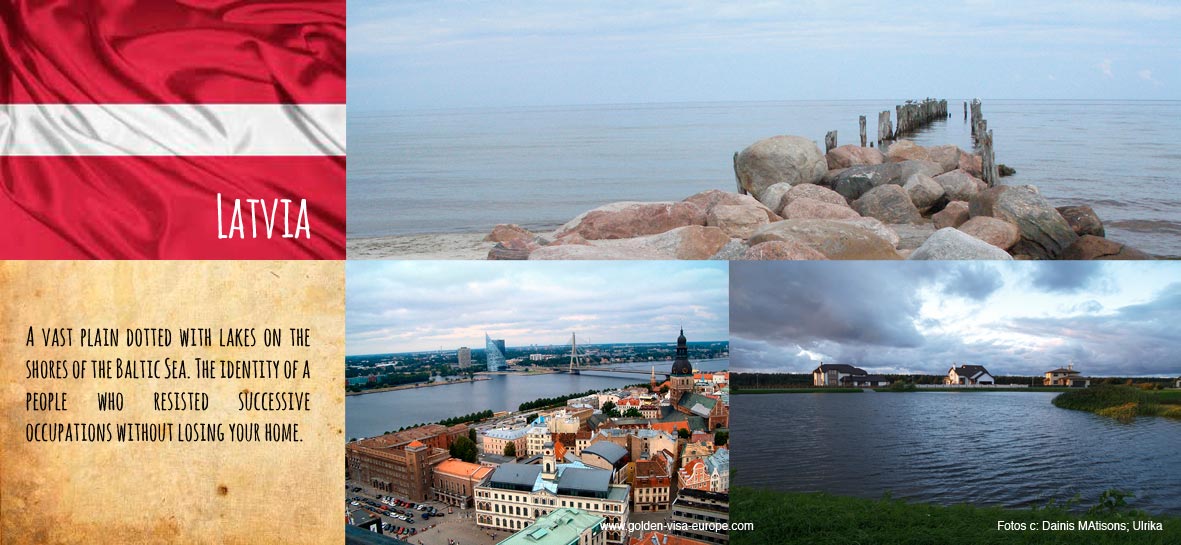 For example when Mansky bought his flat in Riga, he had to spend at least € 142,000; the same expenditure was required in Jurmala, a seaside resort very popular with Russians since Soviet times. But less desirable property outside of Riga required an investment of only € 70,000.
For example when Mansky bought his flat in Riga, he had to spend at least € 142,000; the same expenditure was required in Jurmala, a seaside resort very popular with Russians since Soviet times. But less desirable property outside of Riga required an investment of only € 70,000.
Over the past five years, more than 13,518 foreigners - enough to populate a small town - have obtained residence permits under the program, which until recently was the cheapest in Europe. Unlike similar programs in other European countries, four-fifths of Latvia’s applications come from the former USSR states, mainly Russia whose citizens have obtained 10,000 of the permits.
The number of applications spiked after the start of the pro-European protests in Ukraine in late 2013 and after Russia’s 2014 annexation of Crimea. Nearly twice as many people from Ukraine applied in 2014 as had in the previous year. The wave from Russia began after Putin was re-elected president in 2012 and continued at almost the same level last year.
Mansky was born in Ukraine but spent most of his life in Moscow. He founded ArtDocFest , Russia’s independent documentary film festival, and has won international awards. The director says the supportive attitude of the Russian authorities changed when he decided to make a documentary on the events in Ukraine, viewed through the prism of his own family’s history.
According to Mansky, his project won initial backing from the Russian Ministry of Culture, but that soon changed. “They began saying the film would be delayed as the situation in Ukraine was unstable and, God forbid, that our best director would end up there. I could understand that they were lying,” Mansky says. Eventually, the minister himself made the situation crystal-clear: “While I am the Minister for Culture, no project which is associated with Mansky will receive state support,” the minister told Interfax news.
Officials in Riga don’t know how many of the 10,000 new immigrants from Russia are similar to Mansky in looking for greater freedom and how many are criminals hiding assets or laundering their ill-gotten gains.
And there are grounds for concern.
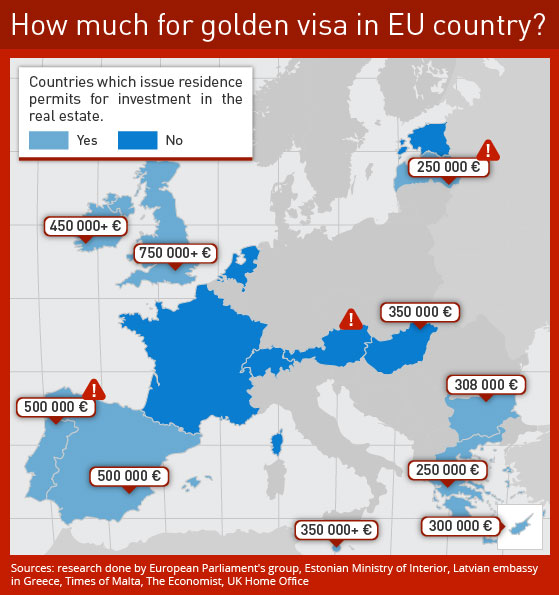 In 2013, police in Rome raided a home owned by relatives of the fugitive Kazakh oligarch Mukhtar Ablyazov, an opponent of the current president of Kazakhstan who is wanted in several jurisdictions for alleged financial crimes.
In 2013, police in Rome raided a home owned by relatives of the fugitive Kazakh oligarch Mukhtar Ablyazov, an opponent of the current president of Kazakhstan who is wanted in several jurisdictions for alleged financial crimes.
Ablyazov escaped the dragnet; he was later picked up in France, where he is fighting extradition. Italian officials discovered his wife and six-year-old daughter were living in Italy thanks to residency permits obtained from Latvia and the United Kingdom (UK).
Those papers entitled the Ablyazov family to travel or live anywhere in the European Union they wished. The Latvian permit opened the door to all 26 countries of the Schengen group ; the second permit was necessary because the UK isn’t in Schengen.
The case caused an uproar in Italy. Italian officials deported Ablyazov’s wife and daughter to Kazakhstan. They were later allowed to return to Italy where they received refugee status in 2014. Ablyazov remains in custody in France, pending extradition.
The fleeing middle class
Over the past year, OCCRP partner Re:Baltica collected information from land, property and business registers in Latvia and analyzed the 315 most expensive real estate deals in Riga and Jurmala involving foreigners. The purpose was to get a snapshot of the people who have opted for Latvia's “golden visa” program and where they got their money.
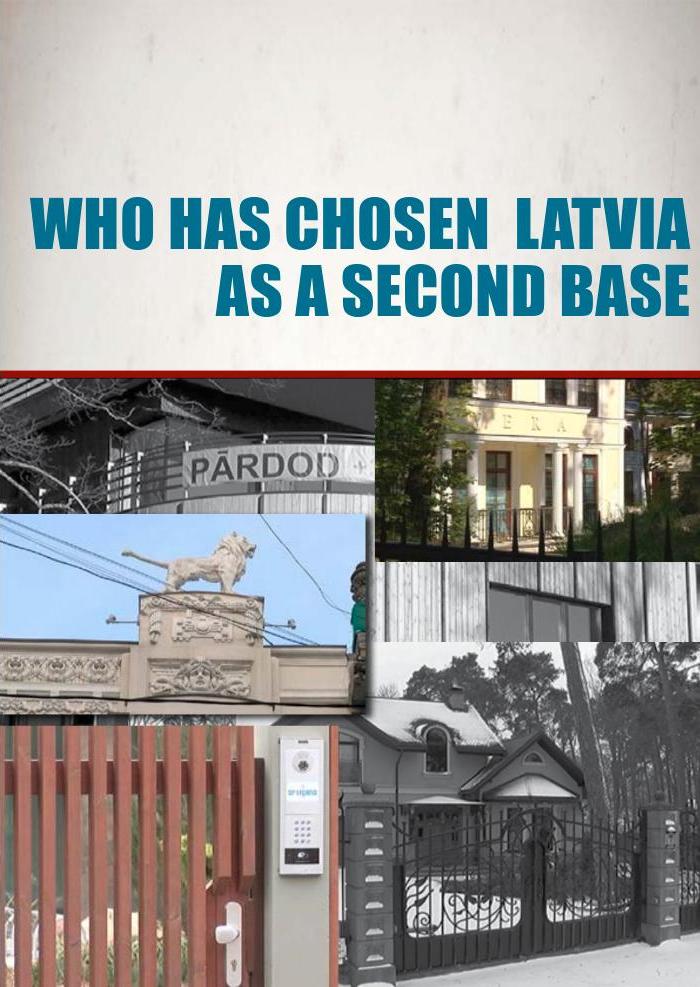 The investigation reveals that between October 2013 and September 2014, most of the buyers were from the Russian middle class, which Re:Baltica defines as well-off to affluent but not super-rich, such as businesspeople and middle managers.
The investigation reveals that between October 2013 and September 2014, most of the buyers were from the Russian middle class, which Re:Baltica defines as well-off to affluent but not super-rich, such as businesspeople and middle managers.
Some were connected with medium-sized private businesses, especially in the financial sector. Most of the surnames were not well-known, possibly because the properties were purchased under family members’ names, or the buyers were not public figures.
Some could be identified as Russian journalists and artists. Satirist and television personality Mihail Zadornov added to his real estate portfolio an apartment in one of Riga’s celebrated Art Nouveau buildings.
Two others are new neighbors thanks to purchases in Jūrmala: actress Tatyana Dogileva and Yury Askarov , one of the faces on the Russian humor show KVN.
A small number of permit holders are managers of state-controlled companies or their subsidiaries, particularly those connected with the energy giant Gazprom. They include Nikolai Korenev , deputy chairman of the management board at Gazprombank , which is subject to US and EU sanctions ; and several managers at Transtelekom , a subsidiary of the state-owned giant Russian Railways, whose CEO is among Putin’s inner circle.
Residence permits have also been obtained by Vadim Zingman, Aeroflot’s Deputy Director-General for Customer Service; and two former top employees from the banks VTB and Bank of Moscow or their relatives (both banks are subject to EU and US sanctions).
The family of Alisher Usmanov, named Russia’s richest man by Forbes, concluded one of the most expensive deals, spending nearly € 4 million for a villa in the resort town of Jurmala , but apparently did not apply for residence permits (there is no legal requirement to do so). His wife's son, who is the legal owner of the property, did not respond to inquiries.
Dmitry Orlov , a political scientist with close ties to the Kremlin and a member of the Supreme Council of Putin’s party United Russia , denied in a phone conversation in early February that he’d received a residence permit, but not that he’d bought property in Latvia. The data in the property register matches Orlov's name and date and year of birth . No one answered the posh apartment's doorbell in Riga.
This group has joined other former Russian parliamentarians from Putin's party, most of whom are now businessmen, who bought real estate in previous years and whose families hold residence permits. Among them are Eduard Yanakov , who apart from a metallurgical business is believed to have a stake in Latvia's Russian language media , and Vladimir Shemyakin , who until recently was a leading official in Gazprom-Media Holding , affiliated with Gazprombank.
“As Gazprombank is not a state company, this theme is not important to us,” Re:Baltica was told by Gazprombank’s press office. Both Shemyakin and Yanakov declined to comment.
Re:Baltica partner TV3 reported on its investigative program “Nothing Personal” that Putin’s close friend, billionaire Arkady Rotenberg, was one of the first to obtain a residency permit in 2010 , although he has since allowed it to expire. He did not get the permit by buying property but by depositing money in a bank.
Prior to the EU and US sanctions, Arkady Rotenberg and his brother Boris Rotenberg owned SMP Bank in Latvia . Both Rotenberg brothers are considered close to Putin and are on sanctions lists; property owned by Arkady Rotenberg in Italy was seized when the sanctions kicked in.
Boris Rotenberg owned a property in a quiet and rich residential area in Garkalne, not far from Riga, via the company. Because he has Finnish citizenship he did not need to apply for a residency permit.
In August of 2014 Boris Rotenberg transferred his shares in the company which owns the house to his son, Roman Rotenberg, who is the vice president of Gazprombank and the vice-president of SKA Hockey Club. Shortly before US and EU sanctions came into force, the bank’s shares were transferred to local residents.
Others in the Russian expat community say that the decision to invest in Latvia was personal, not political. “It’s a dream I’ve had for a long time. The city is interesting and I just wanted a little nest there,” explained Russian investor Alexander Rudik who is on the board of directors of RusForest, a Swedish-owned timber company operating in Eastern Siberia.
“Also, there is a good corporate tax system for business in Latvia, and I’ll consider whether I should transfer part of my business operations there. I’m not thinking about living in Latvia permanently, it’s more a summer home thing. I will seek a residence permit though, as it’s useful for travelling freely around Europe.”
Unofficial but trusted sources said that among the applicants for permits are people who are connected with Rosneftj, Rosneftegaz, Rosatom, Lukoil, Nacionalnaya gazovaya kompanya,Transneftj and others, but Re:Baltica was unable to identify them in the survey of the most expensive real estate purchases during the last year. Some of these companies have been sanctioned.
Money vs security
Fifty years of Soviet occupation and attempted Russification have helped to drive down the percentage of Latvians in the country . The demographic changes have left the country with deep scars; one in four residents identifies as “Russian” on census forms. Of those approximately 500,000 people, one-third (or 172,000 residents) do not hold Latvian citizenship and, fairly or not, some Latvians question their loyalty to Latvia.Who has acquired residence permits in Latvia
The recent influx of Russian citizens entering Latvia under the residency program has alarmed nationalist politicians, who worry that the new residents will be unwilling to become a part of Latvian society. The nervousness was exacerbated by the fact that Putin cited the “protection of compatriots” as a reason to invade neighbors including Crimea, Abkhazia, the Donbass and other neighboring lands.
“By continuing to issue residence permits to Russian citizens, we are playing Russian roulette in the truest sense of the term,” center-right National Alliance member Edvīns Šnore said in Latvia's parliament last year.
In May 2014, the parliament raised the value of the required real estate purchase from a minimum of € 70,000 to € 250,000 , putting Latvia on a par with Greece , which previously had the next lowest property investment requirement in Europe.
The new threshold, plus the dramatic fall in the value of the ruble, resulted in a sharp drop in the number of purchases. Between September 2014, when the new legislation came into force, and the end of January, 67 applications for permits have been filed.
But, with the rapid cooling of the Latvian economy, the real estate lobby has renewed its fight to get the lucrative business back. A member of Parliament from the ruling party Unity has submitted a bill which would drop the investment threshold well below the initial levels: the minimum investment would be € 50,000 for not one but three properties outside Riga.
The lobby, which represents wealthy businessmen, real estate developers and banks whose client base is mainly people from the former Soviet Union, notes that since the economic crisis builders of new projects have focused on foreign buyers. Lobbyist Viktors Valainis, a former member of Parliament, says if these projects are halted, investments worth € 200 million and employment for 5,500 people in associated sectors will be at risk.
The stance is strongly opposed by nationalist members of the ruling coalition, the country's Defense M inister Raimonds Vējonis of the Greens and Farmers Union and also the security services.
They say they are worried less about an inrush of illegal funds or organized crime than about the possibility that due to the large number of applicants, they will be unable to screen out people who are a danger to state security. “The law which is currently in force has reduced potential risks,” said Chief of Security Police Normunds Mežviets. “Looking at it from the aspect of national security, I can’t see the need to make any changes.”
Meanwhile Mansky, the filmmaker, continues to work on his film with his partners in Latvia. Of the latest wave of Russian arrivals, he says, “Everyone has their own reasons. Maybe there are some who are fleeing Russia, but Riga isn’t the safest place either ideologically or geographically.”
He says the ongoing war in Ukraine is a stark reminder that things can change for the worse “in five minutes.” “In a country so dependent on one person absolutely anything can happen.”
Ilze Jaunalksne (Riga), Olesya Shmagun (Moscow) and Elena Loginova (Kiev) contributed to this report.




